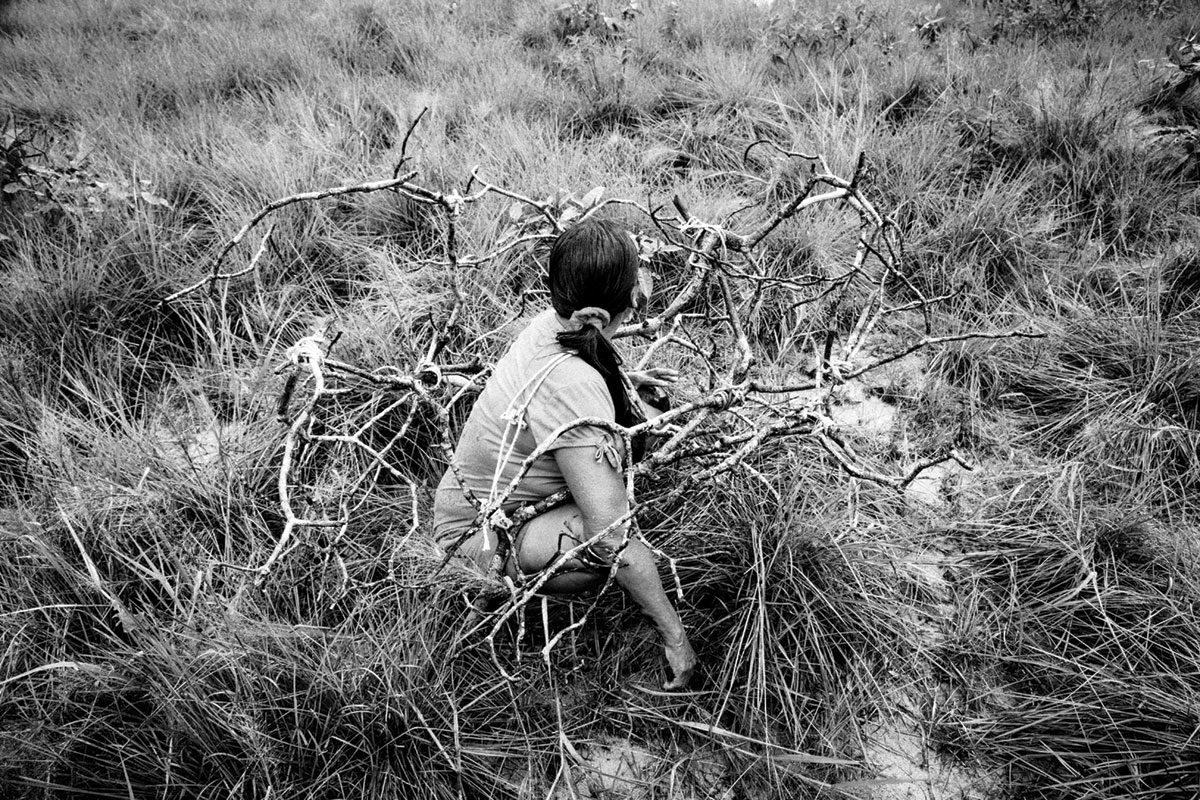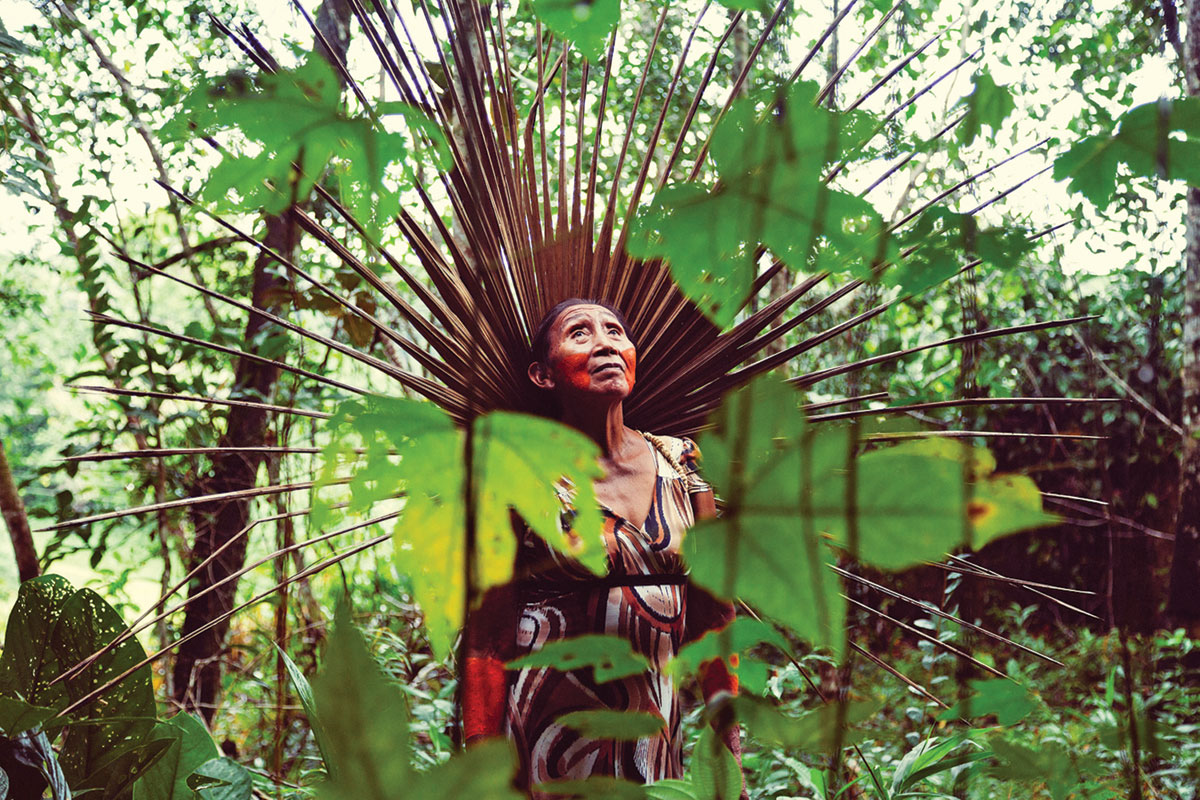Five Poems in
Indigenous Languages
This page features a selection
of work from some of the finest contemporary poets in Latin America. Presented in five richly distinct languages, with English translation, these poems offer just a glimpse of the immense cultural diversity of our hemisphere’s indigenous communities.
Guaraní
An official language of Paraguay, also spoken in parts of Bolivia, Argentina and Brazil Poem by Susy Delgado
III
Petei jey
che mba’e ñandu,
che mba’e rayhu,
che mba’e pota,
che mba’e pochy,
che mba’e rairo,
che mba’e mbyasy,
oikóne chugi
mba’ejue,
ñe’engue,
mba’eve
Pyhare jeyne upéro
III
And perhaps sometime
my premonitions
my love
my desire
my rage
my fits
my nostalgia
will become
an old thing
old talk
empty talk –
and then it will be night again.
Translated by Susan Smith
From Ayvu Membyre/Offspring of the Distant World, Arandura Editorial, 2001

Wayuu
Spoken by the Wayuu in northern
Colombia and Venezuela
Poem by Vito Apüshana
Kataa–Ououta
Mioushii wayaa ma’akaa saain wunuu, sulu’upuna
Nouchikii na wapuulerua janakanat.
Kepiashii, wayaa ma‘akaa saain aleket sakaa
Einuushii sutuma wei.
Emejirashii wayaa sotpa wuñaasü
Chashii wayaa a’lapuujain nakaa kashii numaa ka’i
Suma’inru seyu wayuu
Outushii wayaa ma’akaa katuule wouu.
Live–To Die
We live, like trees, inside
the footsteps of our ancestors.
We live, like spiders, in the net
of the maternal lair.
We always love on the edge of thirst.
We dream there, between kashii and ka’i*
in the premises of the spirits.
We die as if we still were alive.
Translated by Nicolás Suescún
*kashii and ka’i: the moon and the sun
From Voces cercanas del antiguo corazón del Monte, first published by PIW, 2008

Nahuatl
Spoken by the Nahua people in central
and southern Mexico Poem by Mardonio Carballo
Nana i Tlajtol
¡Tetan, xtlatzotzona!
Xochipitzauak nij nejtika nij kakis
Tlaj kejnopa tij chiua, na kualy ni mits tlakualchijchiuas
cuatochintlapanili
chichietl uan yauitltlaxkali
¡Xtlatzotzona, tate!
¿Tlen tij chihuaesen tlaj ax tij neki?
Yajkenya nochi to koneuan
zan ta
zan na
tiakan ti mo zeuitin
zan ta
zan na
zan tojuan tij kitazen ken zeuis ni tonati
¡Xi nech yolpajti, Tate!
(Uan na kualy ni mits tlamakas)
uan tlaj kualy ti tlakua tij kitas ken zempa ti mayanas.
A Woman’s Word
Hubby, play!
The Xochipitzauak,1 I would like to hear
if you agree and play, a nice meal I’ll make for you
rabbit huatape2
wild beans and freshly baked tortillas
C’mon, hubby, play!
What could we do if you don’t want to?
Our sons are already gone
only you
only me
let’s sit down now
only you
only me
to see the day dies down.
Hubby, cheer up my heart!
(So I’ll give you a nice meal)
Then you will see how hunger awakes inside you once again.
Translated by Ileana Villarreal
1 Traditional song of the Nahua. It conveys feelings of celebration, birth and death. It is played only at important occasions.
2 A traditional Nahua atole soup made with rabbit.

Mapudungun
Spoken by the Mapuche in central Chile and Argentina
Original Spanish poem by Graciela Huinao
Ngillatun en la Costa
Para poner tranca a la miseria
cada cierto tiempo
los williche de la costa
desclavan de sus ruka las penas.
Se descuelgan de la historia
y a Pukatriwe llegan
espantando con el Ngillatun
al maligno espíritu del hambre
que va en estampida por la cordillera.
Los williche y el mar
en vigilia
comulgan tiempos de miseria.
Ngillatun Lafken Meu
Sechuam ñi ngüñün engün
kiñeke meu
chi pu williche lafken meu mülelu
entukülafakeingün ñi weñangkün ruka meu.
Entupültrüu-küpalkeingün
Ka puukeingün Pukatriwe meu
wemüalu ngillatun meu
chi wesake püllü ngüñün meu
yalal amulelu pire mapu meu.
Chi pu williche ka chi lafken
kuñiutukuniewingün.
Translated by Clara Atinao Varas
Ngillatun1 on the Coast
To bar misery from entering,
at certain times
the Williche2 of the coast
unnail their grief from their ruka.3
They step down from history
and arrive at Pukatriwe,4
frightening with the Ngillatun
the malignant spirit of hunger
that stampedes through the mountain range.
The Williche and the sea
keep vigil
sharing times of misery.
Translated by Margaret Towner
1 The most important religious ceremony of the Mapuche people.
2“Willi” means “south” and “che” means “people,” in Mapudungun, the language of the Mapuche. The Williche are the “people of the south.”
3 The traditional house of the Mapuche people.
4 A sacred fishing cove where the Williche make a
pilgrimage for their religious ceremonies.
Zapotec
Spoken by the Zapotec people in southern Mexico Poem by Victor Terán
Lá lu’
Ridxí ne huaxhinni, lá lu’.
Siadó’, huadxí, lu gueela’,
nisi lá lu’ riree xieque
ndaani’ bichuga íque’
sica tuuxa zeguyoo
runi biniti guendabiaani’,
nisi lá lu’ riree chuuchi
lu ludxe’
sica benda ndaani’ ná’
ti guuze’.
Guindisa’ ti gui’chi’, lá lu’.
Cuaque’ ti xiixa, lá lu’.
Gabati’ nalu’ nuaa’
cadi daabi guichi lá lu’
íque bicuini naya’
ne ratiicasi zedide’
málasi gó la’na’
guendarietenala’dxi’ lú lu’
ñee xquendanabane’.
Ma yanna nga nabaana
ne huidxe mápeca saa guidxi.
Zándaca ridxí zaxhaca la’dxi’
sá’ nanda huaxhinni.
Zándaca naa guibane’ ti dxi
ne guirá’ ca yaya xtí’ xquendagute’,
zapa ruá’ ti nisadó’ guendaricaala’dxi’
ndaani’ ladxiduá’ guzeete’ lá lu’,
zápa’ rua’ neca xtuudxi huiini’ bi
guzayaniá’ ti dxumisú birixhiaa
gusitenala’dxi’ lii guendaranaxhii stinne’
sica rusietenala’dxi’ laanu ne xquendayaya
dxi ma zeedadxiña xhí nisaguié.
Your Name
Day and night, your name.
In the morning, the afternoon, at dusk
only your name spins
through my head
like a man straight-jacketed
for having lost his mind;
only your name slips
over my tongue
like a fish between the hands
of a fisherman.
I lift a paper, your name.
I put something away, your name.
There is nowhere I go
that I do not have the thorn of your name
nailed to the tip of my finger
and no matter where I go,
the memory of your face silently bites
the leg of my existence.
It is time for Lent
and May’s festival is near.
Perhaps the day is fed up
with chasing the night.
Maybe one day I’ll wake up
to the scandal of my death;
despite it all I’ll have an ocean of sighs
in my soul, to whisper your name;
I’ll undoubtedly have one last breath
capable of filling a basket with winged ants
that will proclaim the love I have,
like the commotion that announces
coming rains.
Translated by David Shook
First published in World Literature Today, 2009
The photos in this feature come from Dislocaciones interiores (Inner Disruptions) and are the work of Liliana Merizalde, who traveled to the Vaupés region of her native Colombia to document the lives of indigenous communities living in the area. Her photographs display the “strenuous lives” of five indigenous women who have variously dealt with armed conflict, forced displacement, estrangement from tradition, and everyday hardship. Merizalde’s
work features “prostheses” created from organic, local materials that were attached to the women to symbolize the unmet needs of their daily lives. Industrial designer Cristina Borda and Donal Edward Arango, an artist
from the region, collaborated on the project. See here for more about the photography.


